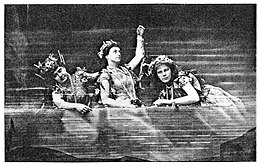Marie Lehmann

Marie Lehmann (born May 15, 1851 in Hamburg , † December 19, 1931 in Berlin ) was a German opera singer with a soprano voice and a singing teacher. She had a coloratura soprano part , but she also appeared in Wagner's works, for example in the first complete performance of Der Ring des Nibelungen at the first Bayreuth Festival on August 13, 1876.
Life
Marie Lehmann was born as the daughter of the soprano Maria Theresia Löw and the hero tenor Karl August Lehmann . Her sister was Lilli Lehmann . The mother taught both girls when she worked in Prague after separating from her husband around 1853.
Lehmann made his debut at the Leipzig Opera in 1867 as Ännchen in Weber's Der Freischütz . She worked there for two years and then took a break for two years. She continued her career at the Hamburg Opera in 1871 , sang at the Cologne Opera from 1873 , at the Breslau Opera from 1878, at the Deutsches Theater in Prague from 1879, and finally at the Vienna State Opera from 1891 to 1896. She also took over in Vienna Mezzo-soprano and alto parts. She appeared there as a guest until 1901.
Her broad repertoire included roles in Mozart operas such as Konstanze in The Abduction from the Seraglio , Susanna in The Marriage of Figaro , Donna Elvira in Don Giovanni , and the Queen of the Night in The Magic Flute . She also appeared as Marzelline in Beethoven's Fidelio , Leonore in Flotow's Alessandro Stradella and Christine in Ignaz Brüll 's Das goldene Kreuz . Other roles were Marguerite de Valois in Meyerbeer's Die Huguenots , Adalgisa in Bellini's Norma and Antonina in Donizetti's Belisario . She appeared both in Verdi operas, for example as Gilda in Rigoletto and Desdemona in Otello , and in works by Wagner, for example as Senta in The Flying Dutchman and Sieglinde in Die Walküre .
In Bayreuth , Lehmann sang the soprano solo in Beethoven's Ninth Symphony at the laying of the foundation stone for the Bayreuth Festspielhaus in 1872. In the world premiere of the complete Ring of the Nibelung at the first Bayreuth Festival from August 13 to 17, 1876, she took on two roles, Wellgunde and Rhine daughter the Valkyrie Waltraute. The other two Rhine daughters were her sister Lilli Lehmann and Minna Lammert . They played the scenes in the Rhine in an apparatus which Wagner had designed and which was difficult to realize. When the first scene was rehearsed and finally succeeded, Wagner thanked them with tears of joy, as the assistant director Richard Fricke wrote in his diary. Lehmann appeared again in Bayreuth, in 1896 as the second norn in Götterdämmerung .
After she left the stage, Lehmann lived in Berlin, where she gave singing lessons. She died there in 1931 at the age of 80 and was buried next to her sister Lilli, who had died two years earlier, in the Dahlem cemetery.
Her daughter Hedwig Helbig (1869–1951) became a concert singer and assistant to Lilli Lehmann.
Web links
- Marie Lehmann at Operissimo on the basis of the Great Singer Lexicon
- Philip Gossett: Opera from the Other Side. (image) nybooks.com
Individual evidence
- ↑ a b c d e f g h i j Lehmann, Marie . In: Karl J. Kutsch (Hrsg.): Großes Sängerlexikon . tape 4 . Walter de Gruyter , 2004, ISBN 3-598-44088-X , p. 2667 ( google.com ).
- ^ A b Elizabeth Forbes: The Grove Book of Opera Singers . Ed .: Laura Williams Macy. Oxford University Press , 2008, ISBN 978-0-19-533765-5 , pp. 275-276 (English, google.com ).
- ↑ Lilli Lehmann : My way . Jazzybee Verlag, 2012, ISBN 978-3-8496-3037-9 , pp. 227 ( google.com ).
- ↑ James Andrew Deaville, Michael Saffle: Wagner in Rehearsal, 1875–1876: The Diaries of Richard Fricke . Ed .: Evan Baker. Pendragon Press, 1998, ISBN 0-945193-86-6 , pp. 64–65 (English, google.com ).
- ^ Hans-Jürgen Mende: Lexicon of Berlin burial places . Pharus-Plan, Berlin 2018, ISBN 978-3-86514-206-1 , p. 571.
| personal data | |
|---|---|
| SURNAME | Lehmann, Marie |
| BRIEF DESCRIPTION | German opera singer |
| DATE OF BIRTH | May 15, 1851 |
| PLACE OF BIRTH | Hamburg |
| DATE OF DEATH | December 19, 1931 |
| Place of death | Berlin |
